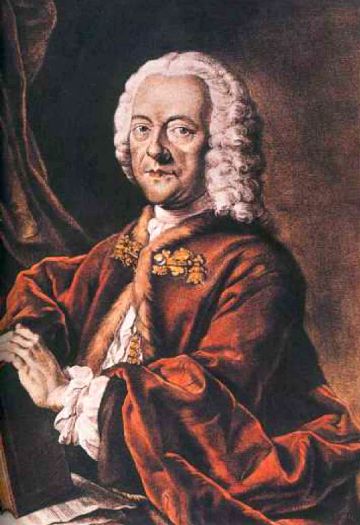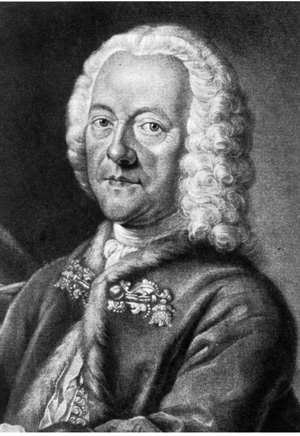

Georg Philipp Telemann
Born: 1681Died: 1767
Education: Telemann entered the University of Leipzig to study law, but eventually settled on a career in music.
Career: Held important positions in Leipzig, Sorau, Eisenach, and Frankfurt before settling in Hamburg in 1721, where he became musical director of that city's five main churches.
Telemann was the son of a Protestant minister and was given a good general education but never actually received music lessons. Though he showed great musical gifts at an early age, he was discouraged by his family from becoming a professional musician, at that time neither an attractive nor a remunerative occupation. By self-teaching, however, he acquired great facility in composing and in playing such diverse musical instruments as the violin, recorder, oboe, viola da gamba, chalumeau, and clavier. In 1701 he enrolled at the University of Leipzig as a law student, but musical activities soon prevailed and were to engross him for the rest of his life. Leipzig became the stepping-stone for Telemann’s musical career. The municipal authorities there realized that, apart from his musical gifts, the young firebrand possessed extraordinary energy, diligence, and a talent for organization. They commissioned him to assist the organist of the Thomaskirche, Johann Kuhnau, by composing church cantatas for alternate Sundays, and also gave him a position as organist at the university chapel, Neuenkirche. Telemann reorganized the collegium musicum, the student musical society, into an efficient amateur orchestra that gave public concerts (then a novelty) and became director of the Leipzig Opera, for which he also composed. Telemann’s next positions were at two princely courts: first as kapellmeister (conductor of the court orchestra) in Sorau (now Żary, Poland; 1705–08), then as concertmaster (first violinist) and later kapellmeister in Eisenach (1708–12). By playing, conducting, studying, and composing he gained the musical knowledge, practical experience, and facility in composing that were to be vital when he assumed the musical directorship of Frankfurt am Main (1712–21) and Hamburg (1721–67). In Frankfurt he was musical director of two churches and in charge of the town’s official music. As in Leipzig, he reorganized the students’ collegium musicum and gave public concerts with the group. In Frankfurt Telemann started publishing music that made him famous not only in Germany but also abroad. As musical director of Hamburg, one of the outstanding musical positions of the time, he supplied the five main churches with music, was in charge of the Hamburg Opera, and served as cantor at Hamburg’s renowned humanistic school, the Johanneum, where he also was an instructor in music. In Hamburg, too, he directed a collegium musicum and presented public concerts. In 1729 he refused a call to organize a German orchestra at the Russian court. He had also declined an offer in 1722 from municipal authorities in Leipzig to succeed Kuhnau as organist of the Thomaskirche. This proffered position, which had been promised him 17 years earlier by authorities in the event of Kuhnau’s death, manifested the high esteem in which even the young Telemann was held. (Following Telemann’s refusal, the position fell to Johann Sebastian Bach.) In addition to all his activities in Hamburg, he also supplied (by contract) the courts of Eisenach and Bayreuth, as well as the town of Frankfurt, with music and continued to publish his compositions. A master of the principal styles of his time—German, Italian, and French—he could write with ease and fluency in any of them and often absorbed influences of Polish and English music. He composed equally as well for the church as for opera and concerts. His music was natural in melody, bold in harmonies, buoyant in rhythm, and beautifully orchestrated. Profound or witty, serious or light, it never lacked quality or variety. Telemann’s printed compositions number more than 50 opuses, among them (counting each as one item) the famous collection Musique de table (published in 1733; containing three orchestral suites, three concerti, three quartets, three trios, and three sonatas); the first music periodical, Der getreue Music-Meister (1728–29; containing 70 compositions); Der harmonische Gottesdienst (1725–26; 72 church cantatas); and 36 fantasias for harpsichord.

